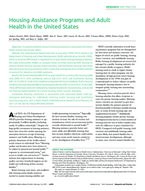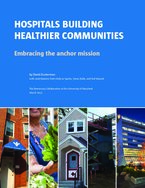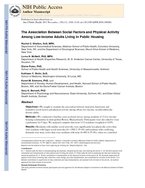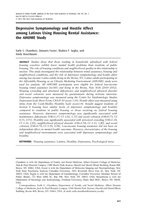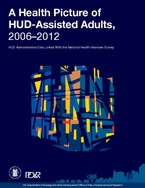0
Research
Community:
Jul 18, 2018
We examined whether receiving housing assistance is associated with improved health and well-being using a nationally representative sample of the US population. Specifically, we examined whether entry into housing assistance was associated with better reported health or reduced psychological distress relative to awaiting admission and whether there were differential effects associated with the 3 primary program categories: public housing, housing choice vouchers, and multifamily housing. Furthermore, we explored whether the health effects of housing assistance are mediated by neighborhood characteristics.
Authored by:
Topics: Health, Housing, Low-income, Mental health, Research
 Shared by Housing Is
Shared by Housing Is
Housing Is posted a
on Jul 18, 2018
We examined whether receiving housing assistance is associated with improved health and well-being using a nationally representative sample of the US population.
0
Research
Community:
Jul 13, 2018
Hospitals Building Healthier Communities aims to provide a resource for hospitals considering adopting or further integrating community engagement and economic development into their daily operations and their core mission.
Authored by:
Topics: Community development, Data sharing, Health, Housing, Low-income, Partnerships, Place-based, Research
 Shared by Housing Is
Shared by Housing Is
Housing Is posted a
on Jul 13, 2018
Hospitals Building Healthier Communities aims to provide a resource for hospitals considering adopting or further integrating community engagement and economic development into their daily operations and their core mission.
0
Research
Community:
Jul 12, 2018
We sought to examine the association between structural, functional, and normative social factors and physical activity among urban, low-income, racially/ethnically diverse adults.
Authored by:
Topics: Exercise, Health, Housing, Low-income, Obesity, Research
 Shared by Housing Is
Shared by Housing Is
Housing Is posted a
on Jul 12, 2018
We sought to examine the association between structural, functional, and normative social factors and physical activity among urban, low-income, racially/ethnically diverse adults.
0
Research
Community:
Jul 11, 2018
Studies show that those residing in households subsidized with federal housing vouchers exhibit fewer mental health problems than residents of public housing. The role of housing conditions and neighborhood quality in this relationship is unclear. This study investigated the relationship between rental assistance, housing and neighborhood conditions, and the risk of depressive symptomology and hostile affect among low-income Latino adults living in the Bronx, NY
Authored by:
Topics: Depression, East Coast, Health, Housing, Low-income, Mental health, Obesity, Racial inequalities, Research, Stability
 Shared by Housing Is
Shared by Housing Is
Housing Is posted a
on Jul 11, 2018
Studies show that those residing in households subsidized with federal housing vouchers exhibit fewer mental health problems than residents of public housing. The role of housing conditions and neighborhood quality in this relationship is unclear.
0
Research
Community:
Jul 11, 2018
A Research Review and Comment on Future Directions for Integrating Housing and Health Services
Authored by:
Topics: Affordable Care Act, Cost effectiveness, Data sharing, Exercise, Health, Homelessness, Housing, Low-income, Medicaid / Medicare, Mental health, Metrics, Nutrition, Obesity, Partnerships, Preventative care, Research, Supportive housing
 Shared by Housing Is
Shared by Housing Is
Housing Is posted a
on Jul 11, 2018
A Research Review and Comment on Future Directions for Integrating Housing and Health Services
0
Research
Community:
Jun 22, 2017
Unprecedented descriptive analysis linking HUD administrative data and results from the National Health Interview Survey (pre-Affordable Care Act)
Authored by:
Topics: Affordable Care Act, Cost effectiveness, Dental, Depression, Exercise, Health, Healthy homes, Housing, Medicaid / Medicare, Mental health, Nutrition, Obesity, Research, Seniors, Smoke-free, Substance abuse
 Shared by Steve Lucas
Shared by Steve Lucas
Steve Lucas posted a
on Jun 22, 2017
From the Office of Policy Development and Research (PD&R) at the U.S. Department of Housing and Urban Development:
Unprecedented descriptive analysis linking HUD administrative data and results from the National Health Interview Survey (pre-Affordable Care Act)
0
Research
Community:
May 24, 2017
CSH reviewed more than 32 studies of supportive housing and compiled information about outcomes (housing, healthcare, and more). These reviews should be helpful for anyone looking to quantify particular impacts of housing. Please note that this review was not undertaken in an academic or systematic way; we make no claims about the strength of these evaluations or their findings.
Authored by: CSH
Topics: Health, Healthy homes, Homelessness, Housing, Supportive housing
 Shared by Steve Lucas
Shared by Steve Lucas
Steve Lucas posted a
on Jun 8, 2017
CSH reviewed more than 32 studies of supportive housing and compiled information about outcomes (housing, healthcare, and more). These reviews should be helpful for anyone looking to quantify particular impacts of housing.
0
Research
Community:
May 3, 2017
This article explores racial disparities between assisted housing outcomes of black and white and white households with children. We compare the assisted housing occupied by black and white households with children, and examine whether young adult education, employment, and earnings outcomes in 2011 differ between blacks and whites who spent part of their childhood in assisted housing in the 2000s. We use a special version of the Panel Study of Income Dynamics (PSID) that has been address-matched to federally assisted housing, and the PSID’s Transition to Adulthood supplement, along with geocode-matched data from the U.S. Census Bureau, American Community Survey (ACS), CoreLogic real estate data, and U.S. Department of Housing and Urban Development (HUD). Statistical methods include difference in means, logit and general linear models. We find no evidence of racial disparities in the type of assisted housing program, the physical quality of project-based developments, or the management of public housing developments in the 2000 decade. But black households with children are more likely to live in assisted housing that is located in poorer quality neighborhoods. Multivariate tests reveal that the worse outcomes of black young adults compared with whites disappear once socioeconomic differences are taken into account. The discrepancy in assisted housing neighborhood quality experienced by black and white children makes no additional contribution to predicting young adult outcomes. Nonetheless, black children living in relatively better assisted housing neighborhoods tend to have better outcomes in young adulthood than those who live in poorer quality assisted housing neighborhoods. We discuss sources of racial disparity in neighborhood quality, and the policies enacted and proposed to address it.
Authored by: Sandra J. Newman & C. Scott Holupka for HOUSING POLICY DEBATE JOURNAL
Topics: Housing, Low-income, Racial inequalities, Research
 Shared by Housing Is
Shared by Housing Is
Housing Is posted a
on Jun 8, 2017
Sandra J. Newman & C. Scott Holupka for HOUSING POLICY DEBATE JOURNAL
This article explores racial disparities between assisted housing outcomes of black and white and white households with children.
0
Research
Community:
Mar 1, 2017
Authored by: The Public and Affordable Housing Research Corporation (PAHRC)
Topics: Education, Housing, Low-income, Post-secondary, Research, Workforce development
 Shared by Keely Stater
Shared by Keely Stater
Keely Stater posted a
on Jun 6, 2017
The Public and Affordable Housing Research Corporation (PAHRC)
 Shared by Housing Is
on Jul 18, 2018
Shared by Housing Is
on Jul 18, 2018
 Shared by Housing Is
on Jul 13, 2018
Shared by Housing Is
on Jul 13, 2018
 Shared by Housing Is
on Jul 12, 2018
Shared by Housing Is
on Jul 12, 2018
 Shared by Housing Is
on Jul 11, 2018
Shared by Housing Is
on Jul 11, 2018
 Shared by Housing Is
on Jul 11, 2018
Shared by Housing Is
on Jul 11, 2018
 Shared by Steve Lucas
on Jun 22, 2017
Shared by Steve Lucas
on Jun 22, 2017
 Shared by Steve Lucas
on Jun 8, 2017
Shared by Steve Lucas
on Jun 8, 2017
 Shared by Housing Is
on Jun 8, 2017
Shared by Housing Is
on Jun 8, 2017

 Shared by Keely Stater
on Jun 6, 2017
Shared by Keely Stater
on Jun 6, 2017





